Universal Audio 1176, Orion, Heavenly and Evermore review – UAFX enters the compact pedal game, but at what cost?
Universal Audio squeezes one of the modes from its larger UAFX pedals into a new compact size – the question is whether this value proposition stacks up
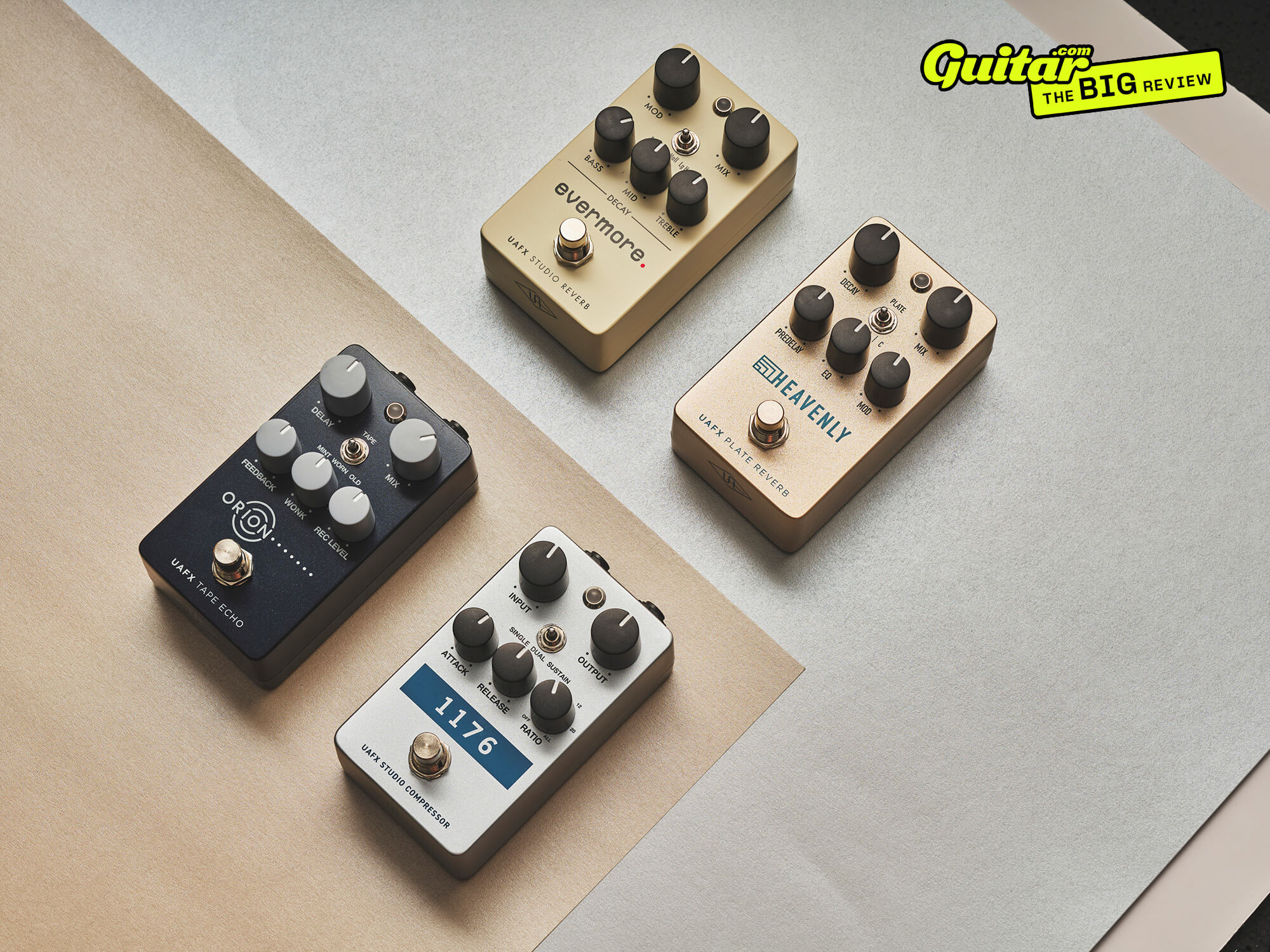
Universal Audio UAFX pedals. Image: Adam Gasson
Review Overview
Our rating
7
Our verdict
$199-$219, uaudio.com
It’s been about two-and-a-half years since Universal Audio made the leap from plugin king to guitar effects maker, but in that time the impact that UA’s distinctive curved oversized enclosures have had on the boutique pedal scene has been profound – where once it was almost a default to see a Strymon pedal nestled somewhere on a pedal-hounds ’board, increasingly UAFX has started to become almost as ubiquitous.
- READ MORE: The Big Review: Universal Audio Galaxy, Del-Verb & Max – the most desirable UA effects pedals yet?
They are big though, those UAFX pedals – about the same width as your standard two-switch pedal but a little bit taller, it’s an awkward proposition for those of us who find pedalboard real estate to be at a premium.
All of which brings us to the point of today’s exercise – four new UAFX pedals that debut a brand new compact form factor that promises to bring Universal Audio’s hugely impressive sounds to smaller boards and smaller budgets.
What are the UAFX Compact Pedals?
The four initial pedals are the 1176 Studio Compressor, Orion Tape Echo, Heavenly Plate Reverb and Evermore Studio Reverb, and all four are of course fully digital emulations of those sounds – there’s nothing analogue at play here.
The sounds should also be pretty familiar, as each pedal’s algorithm has previously been seen as one of the modes on a flagship UAFX pedal – the 1176 was previously part of the three compressor emulations on the Max compressor, the Orion was the Echoplex EP3 mode on the Starlight Echo Station, while the Heavenly and Evermore were the studio and plate modes on the Golden Reverberator.
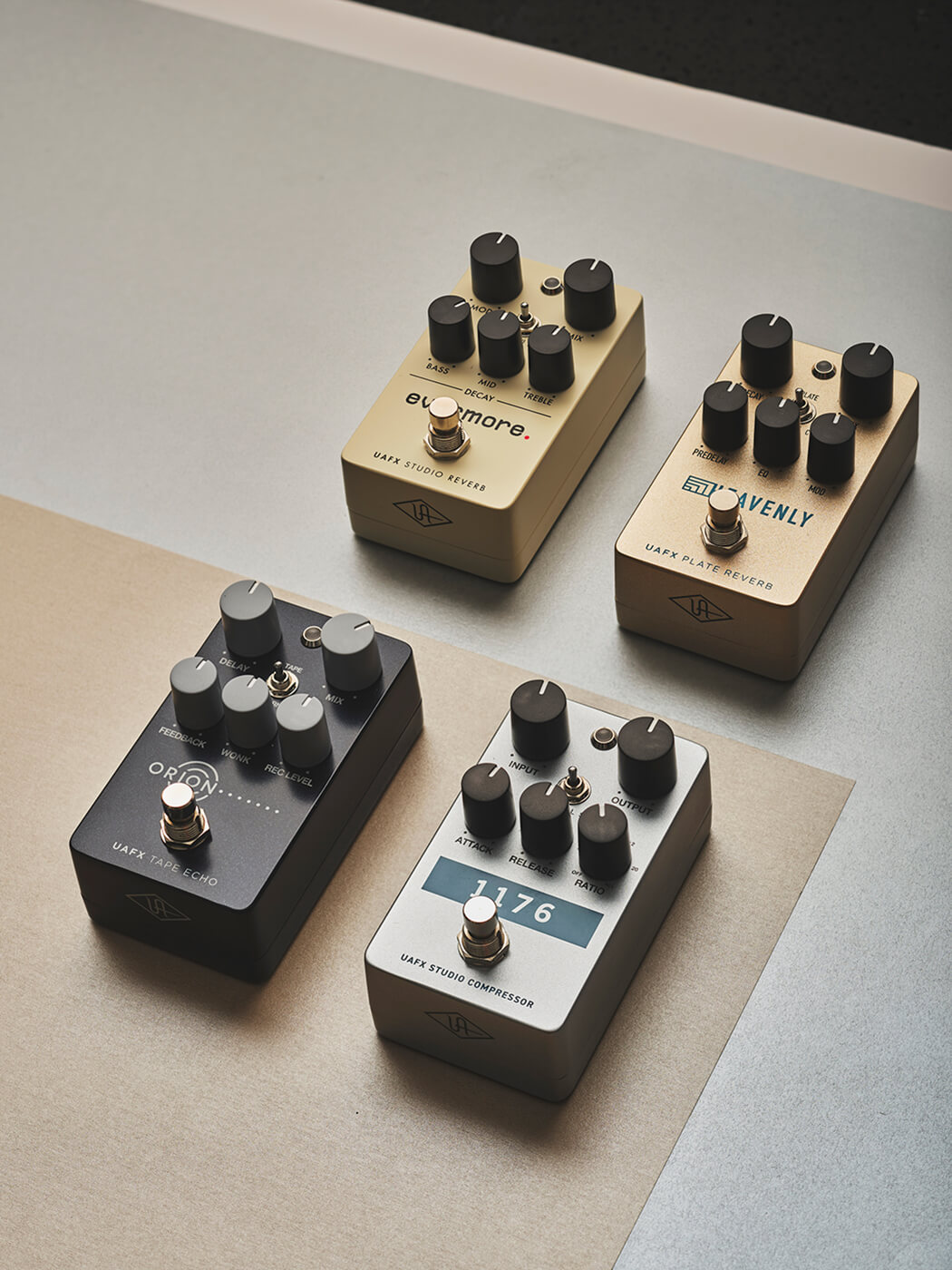
Are the UAFX Compact Pedals good value?
Before we get into talking about the effects themselves, we should talk about the proposition that they’re offering. As stated, these pedals distil one of the three modes of the big guns into a more compact enclosure, but that hasn’t worked out as being a third of the price.
For example, the Golden Reverberator will set you back around $399 bucks at time of writing – yeah, I winced when I typed that too, these are very much premium pedals. The Heavenly and Evermore meanwhile, are priced at $219 at launch, which feels a lot more attainable for your average pedal fella or lass. But there’s no escaping that you’re paying more than half the price of the flagship pedal for one-third of the sounds.
Now, if you only want a studio compressor, or a plate reverb or what have you, then that’s absolutely not a problem – it’s a great way to save yourself some cash and pedalboard space, while streamlining your signal chain to what you really want and need.
It is worth thinking long and hard about whether you really do only need that one sound, however – because for another $180 the big boy gives you significantly more sonic options to play with, plus the ability to tweak your sounds via Bluetooth in the companion app (the compact pedals have USB-C for firmware updates only) and save presets. Oh, and they’re stereo too – whereas these pedals are not.
Are the UAFX Compact Pedals well made?
In a word, yes – UA’s website boasts of these pedals being “ruggedly constructed for years of solid use onstage and in the studio” and they certainly feel the part. The round-edged enclosures are not OEM, pretty much exactly the same size as a Boss compact, and feel suitably weighty without being heavy. We have nicely recessed screws, chunky rubber feet, premium soft-touch footswitches and the same textured knobs seen on the last wave of flagship UAFX pedals, sitting atop pots with a smooth and perfectly judged level of resistance.
You get the same rugged plastic top-mounted jack sockets as on the big lads, and the recessed switches on the top (more on those later) are recessed just enough that you couldn’t knock them accidentally when fiddling with your jacks or power. There’s also a very nice metal cup around the opaque cover of the multi-colour LED – a tiny touch but a classy one.
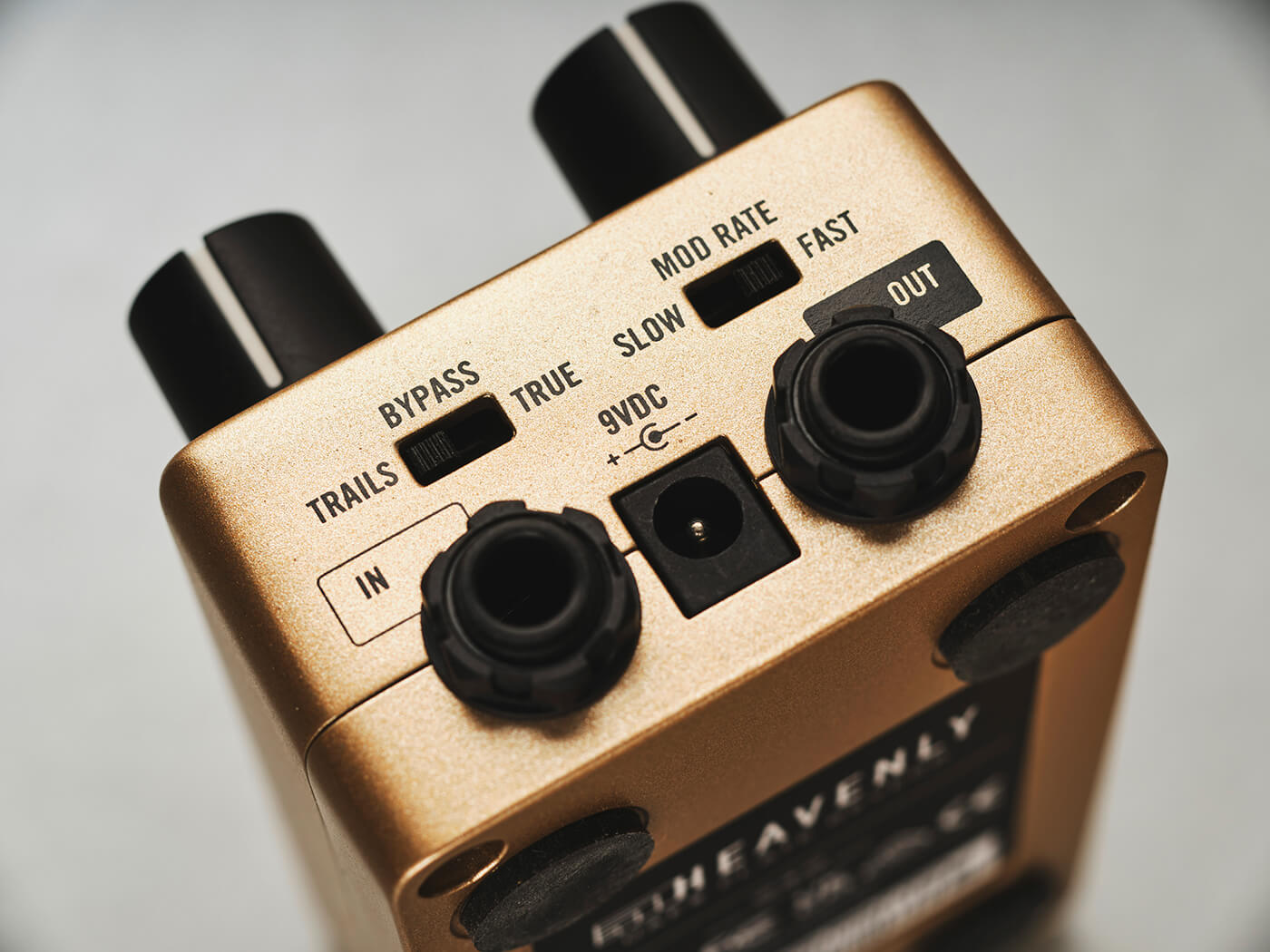
That’s the good stuff, the bad stuff is… well just look at them? While the full-size UA pedals might have been slightly awkward, size-wise, they certainly had a distinct and premium-feeling look. The compact pedals, despite feeling super premium in use, look extremely generic – the plain enclosures mixed with a very stripped-back livery gives a bad vibe of ‘OEM pedals sold on Amazon’ and that is the very opposite of what you want when you’re fighting it out at the $200-plus end of the market.
Some of you may well argue that how these pedals look has absolutely nothing to do with how they sound, and is therefore completely unimportant – and I’m not saying you’re wrong in that assertion. But we live in the world of Instagram and pedalboards that are designed to look as good as they sound – if cool paint jobs and pretty looks didn’t sell pedals, scores of builders all over the world wouldn’t be wasting their time and money on it. It’s not everything, but it’s not nothing either. Anyway, enough chit-chat, let’s dive in…
UAFX 1176 Compressor review
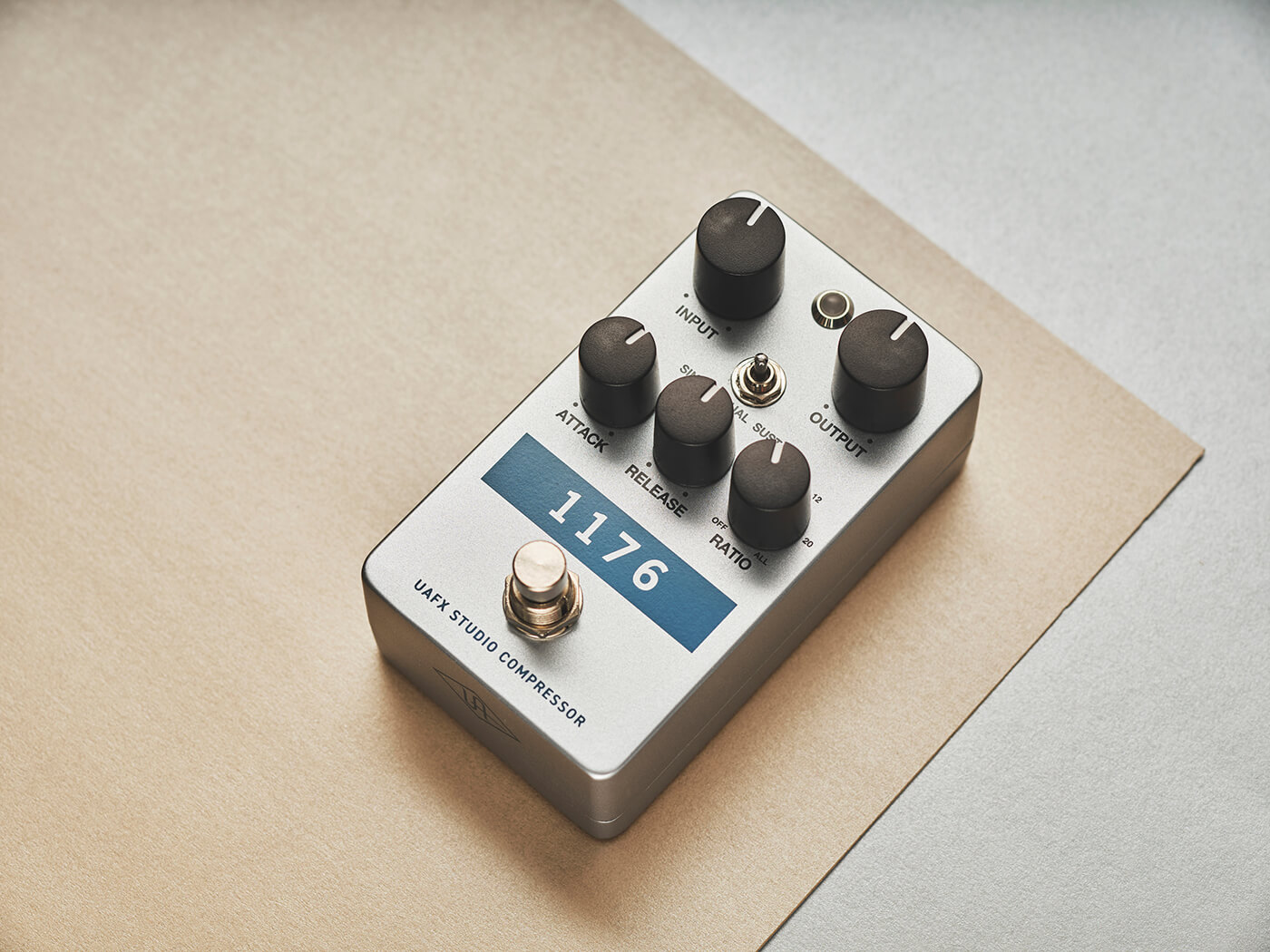
UA founder Bill Putnam designed the legendary 1176 Peak Limiter all the way back in 1968 and ever since it’s been regarded as a benchmark for solid-state studio compressors. Given who made the original then, you’d hope that this recreation would be tip-top, and just like when our Richard Purvis tested it out as part of the Max, I’m suitably impressed.
Handily the 1176 borrows the trick of the Max in that you can select stacked or even parallel (this time via a top-mounted switch) modes.. You also have the ability to switch true-bypass on and off with a top-mounted switch, and all the control that the Max offered is replicated here.
Richard’s biggest criticism of the Max was that it was over-spec’d for most guitarists in terms of how much compressor you actually need. The 1176 then, offers a much more compelling package for guitar players, drilling it down to just one good (and iconic) compressor that still offers plenty of versatility.
Whether you’re beefing up single-coils with just one compressor active or adding some Jimmy Page-esque grit to your tone with the dual mode, the quality of the sounds here is truly top class, while the sustain mode is a perfect slide guitar companion.
In low settings it might not colour your tone much, but that’s very much the point – as an always-on sonic enhancer, you’ll find few better options. If you’ve never found a compressor ‘musical’, this might be the one to change your mind.
UAFX Evermore Studio Reverb review
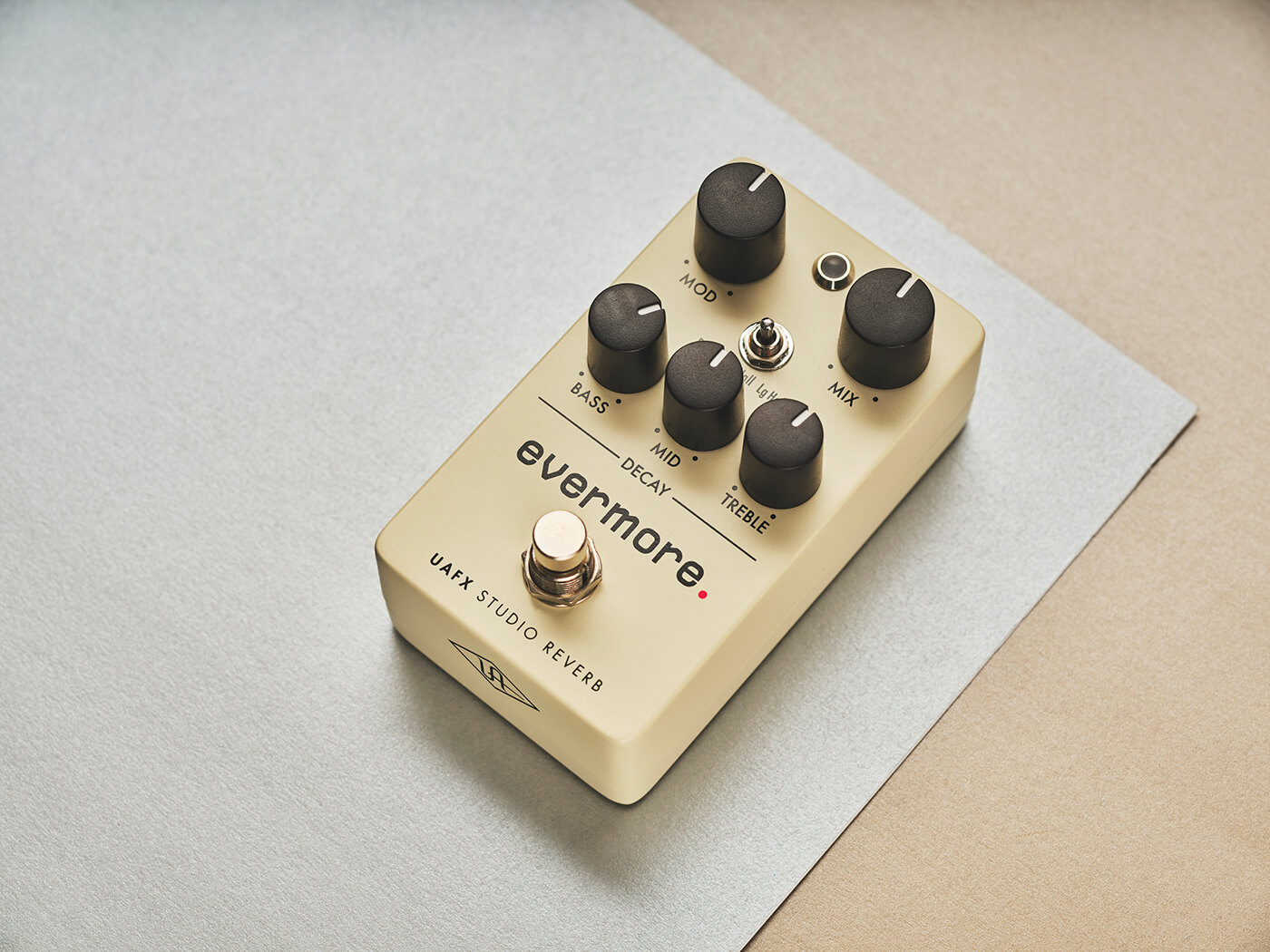
It’s quite rare to find a compact reverb pedal that offers the ability to control the EQ of the decay to accentuate bass, mid and treble frequencies – so if that’s something you honestly think has been missing from your tone-shaping existence, the Evermore certainly ticks that box.
As if that wasn’t a big enough hint, it’s worth remembering that this is very much a specialised pedal – where most compact ‘verbs aim to cover the core spring/plate/room bases, this is just one of those flavours, and probably the most specialised of the three. That means if your requirements extend beyond Lexicon 224 digital ‘verbs, you’ll need another pedal – somewhat defeating the purpose of the cost/space saving.
As for the sounds, well, that’s never been a concern with any of UA’s stuff – the way the mod control and the three EQ pots interact is fun, and it doesn’t take a lot to get yourself into suitably ethereal and self-oscillating soundscapes.
UAFX Heavenly Plate Reverb review
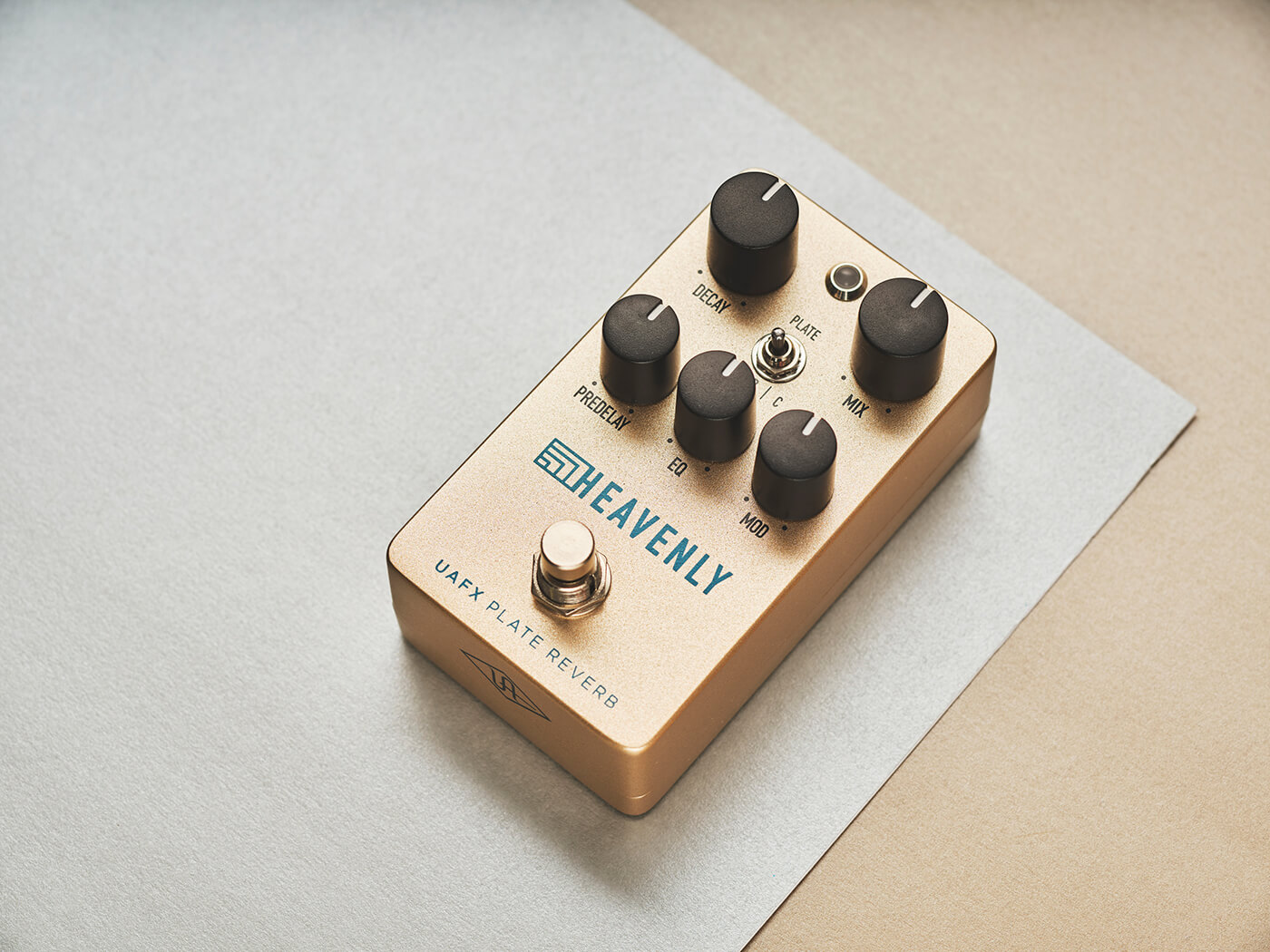
If 50s EMT plate reverbs are your bag then the Heavenly will not disappoint – you can get everything from rockabilly echoes through to more psychedelic wig-outs with the ability to colour your tone with Vintage Bright, Vintage Dark, and Modern Full reverb modes.
The mod control does a nice job of adding grit and colour to your tone, and you have the ability to switch the speed of that modulation from fast to slow thanks to the top-mounted switch.
There’s a fun amount of granularity here that you perhaps wouldn’t expect from a compact pedal, but in the case of both the Heavenly and the Evermore, that ability to get in-depth with your sound feels both a blessing and a curse.
On the one hand, having some of the tweakability you’d expect on a much bigger workstation-type pedal is fun at first, but it doesn’t take long for you to miss some of the benefits of a bigger pedal that you don’t get – not least presets and the ability to save your settings.
As with the Evermore, it’s a fun pedal that offers some great sounds, but it’s hyper-focus on one specific sound limits its utility.
UAFX Orion Tape Echo review
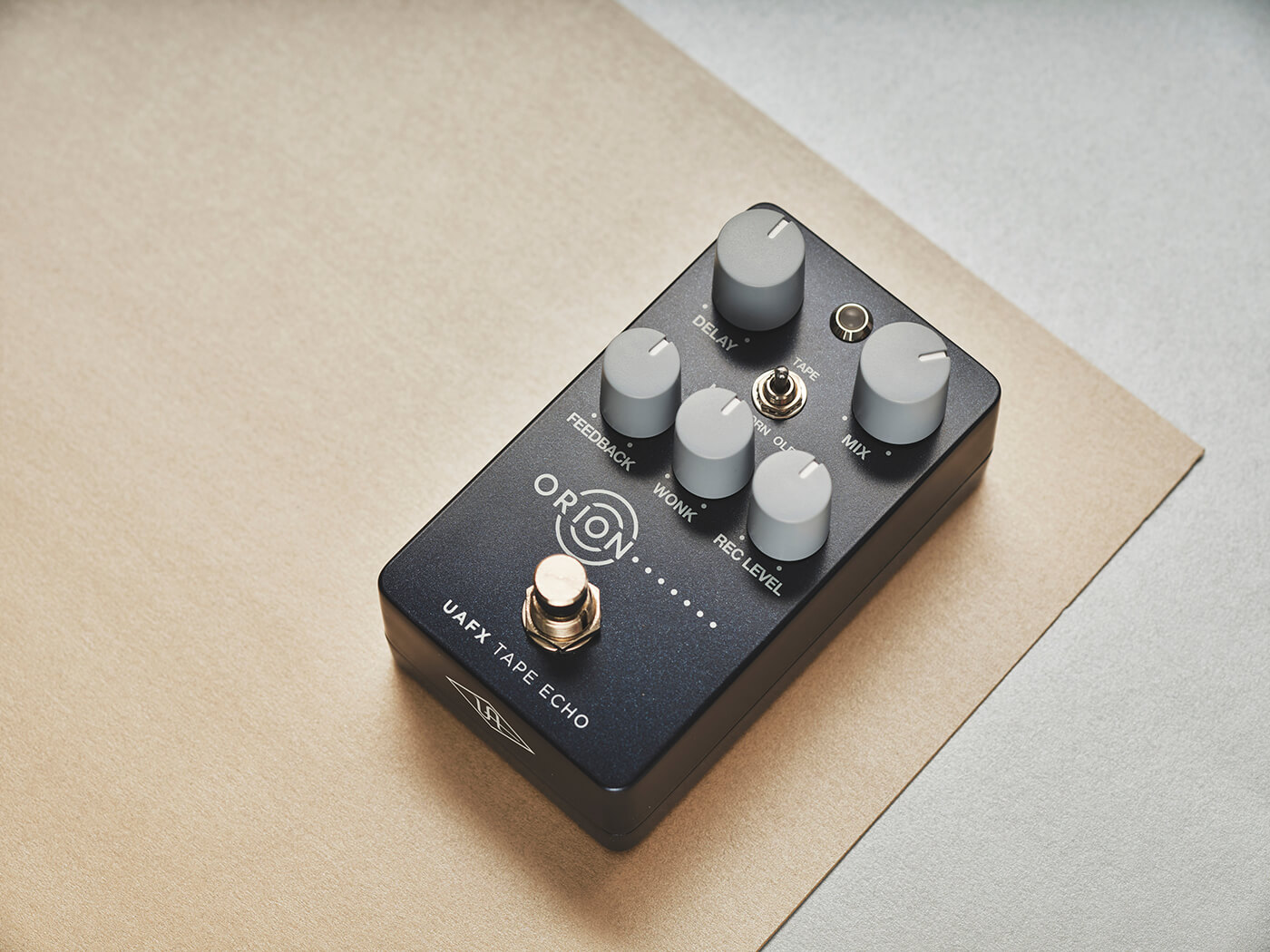
Tape echo is an effect that on the surface of things should be a lot more universal than the specialism of the two reverbs. And that is certainly the case when what we’re talking about is an emulation of the venerable Echoplex EP-3 – an effect that has spawned many well-regarded compact pedal versions, including an official one from Dunlop, and popular options from Catalinbread and Keeley.
What you get with the Orion versus a lot of the compact EP-3 pedals out there is control and tweakability; to switch between various levels of tape wear, plus the pleasingly named ‘wonk’ control that enables you to mess around with the modulation level on your repeats.
As with all good Echoplexes, the Orion also models the legendary preamp, which is activated via the top switch. There’s no way to tweak the gain, but it’s notable how much girth and punch the preamp adds to the delay sound in general. A big part of why UA is such a well-respected player in the plugin game is how good its tape echo emulations are – and this is no exception.
Conclusions: should I buy a UAFX Compact Pedal?
Let’s get this out of the way before I get into the qualifiers here – these are four great sounding pedals that do what they’re supposed to do. As ever with UA, the quality of the digital emulations therein are up there with the very best out there, and in the case of the Orion and especially the 1176, are pretty much the best you’ll find.
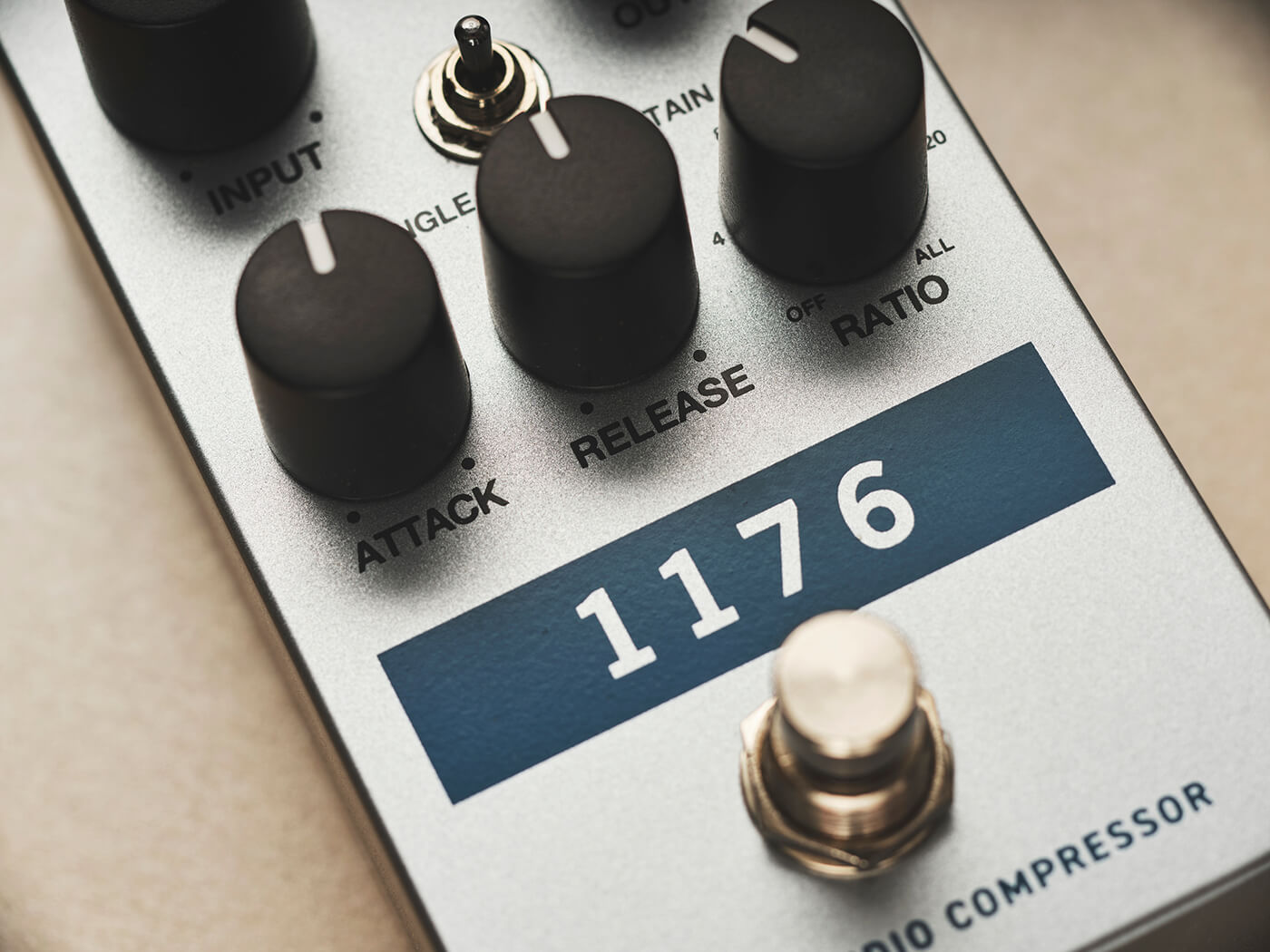
The questions of whether you need something on your pedalboard is always subjective, but here things become even more subjective than usual. I genuinely think that the 1176 offers a more sensible and less overwhelming package for 99% of guitar players and given that it’s cheaper than a lot of other 1176 pedals out there, it’s probably the biggest no-brainer of the quartet – if you’re in the market for a tone-enhancing compressor pedal, you should look no further.
The others are less clear cut. While the Orion sounds great, it feels pricey compared to say, a Catalinbread Belle Epoch, and under-featured compared to a Keeley Eccos. I’m also scratching my head to imagine the guitarist who would want either of the reverbs as standalone pedals, find the granularity of control useful, but then wouldn’t want preset control, MIDI or other similar quality-of-life benefits. And that’s why, 1176 aside, it’s hard to imagine why anyone would take these over the full-sized versions – even with the cost considerations.
Like these? Try these
- Compressor: Origin Effects Cali76 Stacked Edition ($419/ £349)
- Reverb: Walrus Audio Fathom ($215/£199)
- Reverb: Strymon Cloudburst ($279/£279)
- Delay: Catalinbread Belle Epoch ($209/£179)
